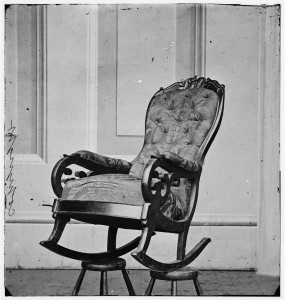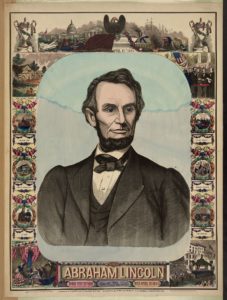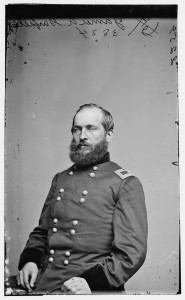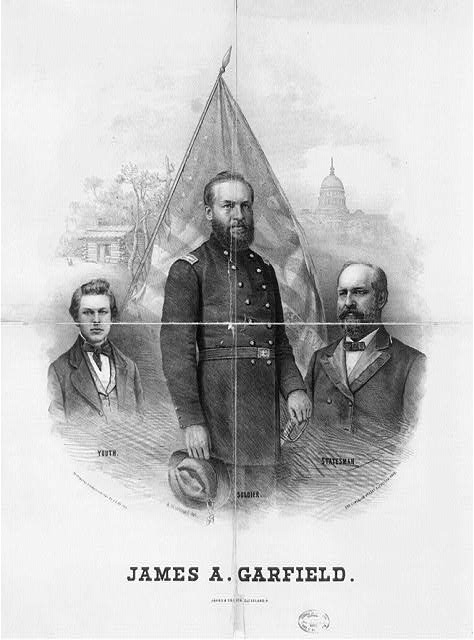To commemorate the first anniversary of the assassination of Abraham Lincoln, President Johnson ordered public offices closed. The House of Representatives met to adjourn – and Congressman James Garfield from Ohio spoke some words of tribute. From The Works of James Abram Garfield (thanks to Google):
THE MEMORY OF ABRAHAM LINCOLN.
REMARKS MADE IN THE HOUSE OF REPRESENTATIVES,
April 14, 1866.
On motion of Mr. Garfield, the reading of the Journal of yesterday was
dispensed with. He then said : —
MR. SPEAKER, — I desire to move that this House do now adjourn. And before the vote upon that motion is taken I desire to say a few words.
This day, Mr. Speaker, will be sadly memorable so long as this nation shall endure, which God grant may be “till the last syllable of recorded time,” when the volume of human history shall be sealed up and delivered to the Omnipotent Judge. In all future time, on the recurrence of this day, I doubt not that the citizens of this republic will meet in solemn assembly to reflect on the life and character of Abraham Lincoln, and the awful, tragic event of April 14, 1865, — an event unparalleled in the history of nations, certainly unparalleled in our own. It is eminently proper that this House should this day place upon its records a memorial of that event.
The last five years have been marked by wonderful developments of individual character. Thousands of our people, before unknown to fame, have taken their places in history, crowned with immortal honors. In thousands of humble homes arc dwelling heroes and patriots whose names shall never die. But greatest among all these great developments were the character and fame of Abraham Lincoln, whose loss the nation still deplores. His character is aptly described in the words of England’s great Laureate, — written thirty years ago, — in which he traces the upward steps of some –
“Divinely gifted man,
Whose life in low estate began
And on a simple village green;
Who breaks his birth’s invidious bar,
And grasps the skirts of happy chance,
And breasts the blows of circumstance,
And grapples with his evil star;
Who makes by force his merit known
And lives to clutch the golden keys,
To mould a mighty State’s decrees,
And shape the whisper of the throne;
And, moving up from high to higher,
Becomes on Fortune’s crowning slope
The pillar of a people’s hope,
The centre of a world’s desire.”
Such a life and character will be treasured forever as the sacred possession of the American people and of mankind.
In the great drama of the rebellion there were two acts. The first was the war, with its battles and sieges, its victories and defeats, its sufferings and tears. That act was closing one year ago to-night, and, just as the curtain was lifting on the second and final act – the restoration of peace and liberty — just as the curtain was rising upon new characters and new events, the evil spirit of the rebellion, in the fury of despair, nerved and directed the hand of an assassin to strike down the chief character in both.
It was no one man who killed Abraham Lincoln; it was the embodied spirit of Treason and Slavery, inspired with fearful and despairing hate, that struck him down, in the moment of the nation’s supremest joy.
Sir, there are times in the history of men and nations, when they stand so near the veil that separates mortals from the immortals, time from eternity, and men from their God, that they can almost hear the beatings and feel the pulsations of the heart of the Infinite.
Through such a time has this nation passed. When two hundred and fifty thousand brave spirits passed from the field of honor, through that thin veil, to the presence of God, and when at last its parting folds admitted the martyr President to the company of these dead heroes of the republic, the nation stood so near the veil that the whispers of God were heard by the children of men.
Awestricken by His voice, the American people knelt in tearful reverence and made a solemn covenant with Him and with each other, that this nation should be saved from its enemies, that all its glories should be restored, and, on the ruins of slavery and treason, the temples of freedom and justice should be built, and should survive forever.
It remains for us, consecrated by that great event, and under a covenant with God, to keep that faith, to go forward in the great work until it shall be completed. Following the lead of that great man, and obeying the high behests of God, let us remember that –
“He has sounded forth the trumpet that shall never call retreat;
He is sifting out the hearts of men before His judgment-seat;
O, be swift, my soul, to answer Him! be jubilant my feet,
Our God is marching on.”
I move, sir, that this House do now adjourn.
In 1881 President James A. Garfield was assassinated during his first year in office. He was shot on July 2nd and lingered until his death on September 19th.
As we can see from the Times clipping Secretary of State William H. Seward announced President Johnson’s order that public offices were to be closed on the anniversary of Abraham Lincoln’s assassination. Of course, Mr. Seward was nearly knifed to death on April 14, 1865. It is not certain when he learned of President Lincoln’s death, but Noah Brooks reported [although disputed] that a few days after the 14th Seward asked that his bed be moved near a window. He saw the flag at half-mast at the War Department and told his attendant that the president was dead: “If he had been alive he would have been the first to call on me; but he has not been here, nor has he sent to know how I am, and there’s the flag at half-mast.” And then the tears flowed over his “gashed cheeks”.[1]
James A. Garfield served nine terms in the U.S. House of Representatives during Reconstruction before his election as president. Here’s an undated quote:
I am trying to do two things – dare to be a radical, and not a fool; which, if I may judge by the exhibition around me, is a matter of no small difficulty. [2]
Mr. Garfield seemed almost Lincolnesque in not pointing his finger at Booth, et. al. and mentioning that the government tracked down the conspirators and hung several of them. On the other hand, the treasonous, slavery-loving states were kept out of the 39th Congress for the most part.
Coincidences still seem to be happening with this weblog. The same week I put up this post I discovered a current reference to the 1880 Republican convention at which James Garfield was nominated on the 36th ballot. [3]
Images from the Library of Congress: chair, cross-crown,badge, general, campaign bio
- [1]Stahr, Walter Seward: Lincoln’s Indispensable Man. 2012. New York: Simon & Schuster Paperbacks, 2013. Print. page 438 and note.↩
- [2]Seldes, George, compiler. The Great Quotations. 1960. New York: Pocket Books, 1967. Print. page 804.↩
- [3]“United States: Open conventions; A user’s manual.” The Economist 9 April 2016: 26. Print.↩




![Mourning badge of colored satin with portrait of Lincoln]. Assassinated at Washington 14 April 1865. I have said nothing but what I am willing to live by. And if it be the pleasure of almighty god to die by. A. Lincoln (LOC: https://www.loc.gov/item/scsm000482/)](https://www.bluegrayreview.com/wp-content/uploads/2016/04/ALmourning-badge-76x300.jpg)

